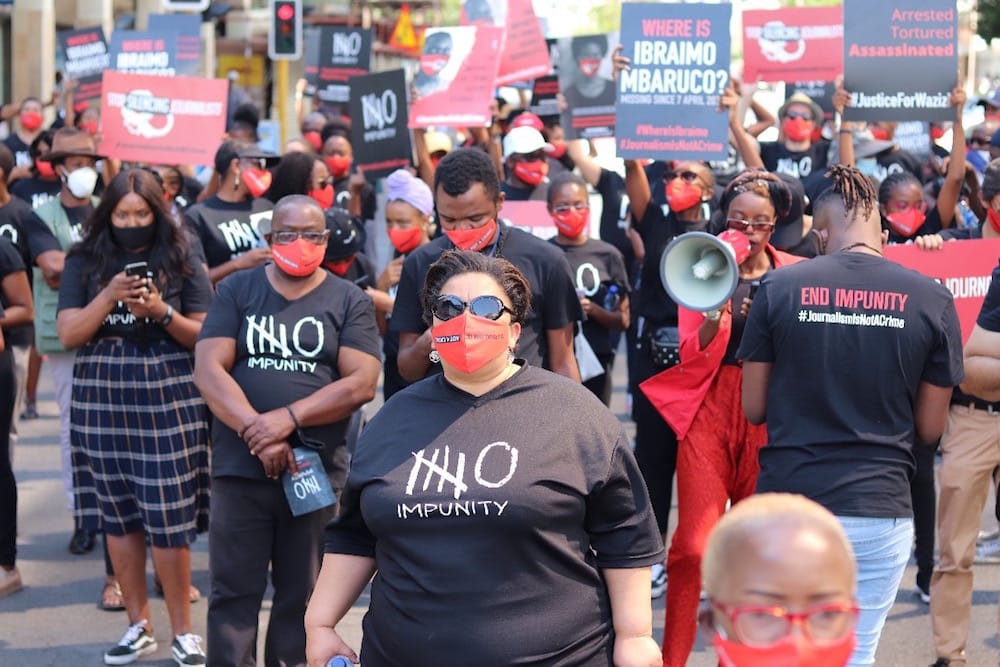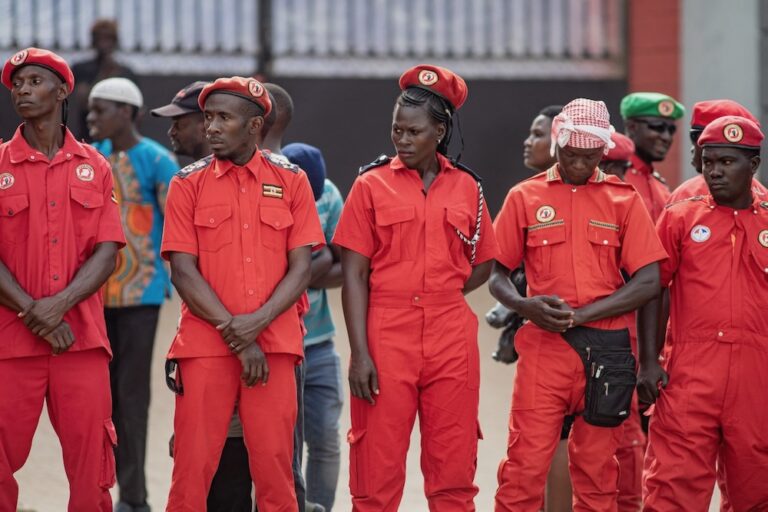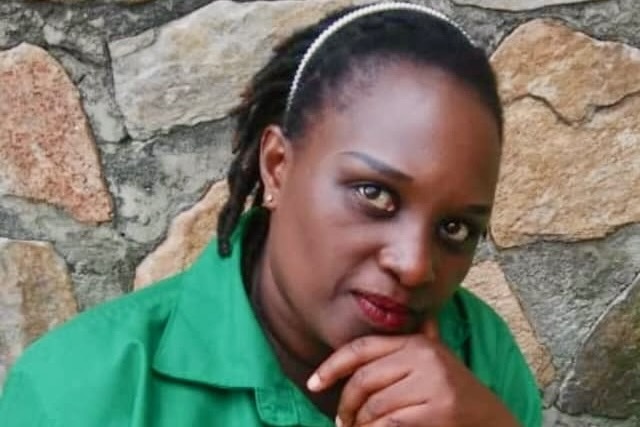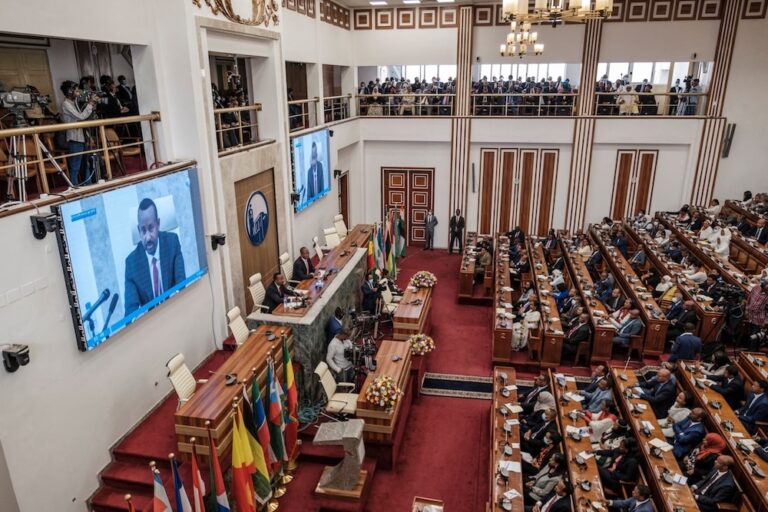October in Africa: A free expression roundup produced by IFEX’s Regional Editor Reyhana Masters, based on IFEX member reports and news from the region. An audio discussion about this piece is available here.
“Continue to speak truth to power. Be bold in your efforts to uncover wrongdoing. When they come for you, remember, you are not alone. We stand with you!” – Namibia Media Trust
“You Are Not Alone” was the message of solidarity conveyed to journalists facing persecution on the International Day to End Impunity for Crimes against Journalists (IDEI) by the Namibian media fraternity.
Organised by the Namibia Media Trust (NMT), the 2 November commemoration saw editors, journalists, students and rights activists take part in a silent procession along Independence Avenue, in the capital city Windhoek, holding up placards and posters highlighting cases of impunity across the African continent.
In her IDEI statement, NMT director Zoe Titus explained: “Standing in solidarity is one of the most powerful counter measures to an excess of power. Collective continental voices remind brazen governments that state-sanctioned misdeeds will not go unnoticed. It becomes an even more powerful tool as it reverberates across borders and continents.”
NMT’s #LetsTakeAMoment campaign focused on missing Mozambican journalist Ibraimo Mbaruco, the unexplained death of Cameroonian editor Samuel Wazizi while in military detention, and journalists killed on the continent whose murders remain unsolved. Tribute was paid to Hodan Nalayeh from Somalia – a country ranked Africa’s most dangerous environment for journalists – and Papy Mumbere Muhamba from the Democratic Republic of Congo, who was hacked to death by unknown assailants for spreading life-saving information about the Ebola virus.
With Namibia holding an impressive ranking of being first in Africa on the Reporters Without Borders (RSF) annual Press Freedom Index, and 23rd overall globally, Titus pointed out that it was even more important for Namibian journalists not to turn a blind eye “when colleagues elsewhere are killed, languish in jails and live in fear of persecution simply for doing their jobs.”
The IDEI theme throughout the continent focused on challenging impunity, with the Wole Soyinka Centre for Investigative Journalism also zoning in on rankings, highlighting the fact that Nigeria was ranked 13 out of 14 countries in a recent Committee to Protect Journalists (CPJ) Global Impunity Index, partly for its failure to solve the murders of journalists over two decades.
IFEX members Media Rights Agenda (MRA) and the International Press Centre (IPC) also put out statements on the continuously rising cases of attacks and violence against media workers and lack of action against perpetrators.
In his statement, MRA executive director Edetaen Ojo reminded the government that “any failure on the part of government to take decisive action to end impunity for crimes against journalists and put mechanisms in place to respond to, punish perpetrators and prevent future attacks will create a vicious circle where journalists do not get justice for the crimes committed against them while the perpetrators are emboldened and will continue such attacks unchecked.”
Ojo proposed a range of options including the establishment of a multi-stakeholder independent commission or the creation of special investigative units; or the appointment of a special prosecutor to include in a strategy to bring perpetrators to justice.
The IPC reiterated the call for urgent investigations of all suspected cases of murder and attacks on journalists and diligent prosecution of the alleged perpetrators so as to halt the disturbing trend of impunity in the country.
A happy exception in a month of disputed elections
In a month of disputed elections on the continent, The Seychelles was an exception. The incumbent Danny Faure conceded his defeat and went on to congratulate his rival Wavel Ramkalawan.
President Ramkalawan was equally conciliatory, and in his inauguration speech, acknowledged: “Mr Faure and I are good friends. And an election does not mean the end of one’s contribution to one’s motherland. In this election, there were no losers, there were no winners – our country was given the opportunity as the ultimate winner.”
The win by the Anglican priest marked the first victory by the opposition since The Seychelles gained its independence from Britain more than four decades ago. The 10-member observer mission from the Eastern Africa Standby Force (EASF) noted that “the first day of special voting was conducted under calm, serenity, transparency and without major incidents.” Some of the concerns highlighted in the initial and short report included the lack of sufficient security features on the presidential ballot paper and isolated cases of voter intimidation.
In complete contrast, the highly contested Guinea presidential election was a scenario of bullets versus ballots, long before citizens went to the polls.
The ever-present tension which periodically spilled out into the streets was heightened following the controversial constitutional referendum in March this year. President Condé used the vote in favour of a new constitution to push the reset button on his two-term presidential limit. Security forces responded to the ensuing protests with brutal violence killing citizens, including two children, and forcibly disappearing at least 40 people.
Lethal clashes between opposition supporters and security forces were triggered once again when Condé’s leading rival Cellou Dalein Diallo announced his election victory a day after the polls closed. He said his announcement was determined by “data his activists gathered at individual polling stations.”
Concerned by the resulting deterioration of the human rights situation, a diplomatic delegation from the United Nations, African Union and the 15-nation Economic Community of West African States (ECOWAS) rushed in to meet with ministers and other government officials to calm the situation.
However, many of the losing opposition candidates remain resolute in their rejection of the announcement that declared Condé the victor. Diallo has gone on to assert that he is in possession of irrefutable proof of irregularities and his lawyer has confirmed plans to appeal the electoral outcome in court. The assertion of anomalies was echoed by losing candidate Makale Traore, who pointed to “serious irregularities recorded before, during and after the vote,” including “substitutions and falsifications” of the results.
Long before polling day on 28 October, Tanzania’s John Magufuli and his government had set the stage for an electoral win. His landslide victory had as its backdrop an array of violations – persistent harassment of and violence against opposition candidates, disqualification of councillors, a restrictive environment, clampdown on freedom of expression, constriction of civic space and an internet shutdown.
Despite the numerous electoral irregularities, Tanzania’s opposition is unable to turn to the courts because of Clause 7 of Section 41 of the constitution, which prevents any legal challenge of the results officially announced by the country’s electoral management body.
President Magufuli’s most powerful tool has been the introduction of an array of restrictions, policies and laws to constrict civic space, severely limit freedom of expression, and generally keep citizens in check.
Three months into his first term, he introduced four bills specifically targeted at regulating the media: the Cybercrimes Act, 2015, the Statistics Act, 2013, the Media Services Act, 2015 and the Access to Information Act, 2015. A blanket ban on political rallies introduced in 2016 was selectively applied against opposition parties right up to this year’s polling day. Leaders of the opposition parties have faced intimidation, harassment, arbitrary arrest and prosecution on trumped-up charges.
His weaponization of the law and the destructive impact it has had on the political, human rights, freedom of expression and freedom of assembly landscape is outlined in detail in an Amnesty international report: Lawfare: Repression by Law Ahead of Tanzania’s General Elections.
Waves of protests across the continent
Aside from disputed elections, October will be remembered for the waves of protest that swept across the continent.
The most notable is Nigeria’s #EndSARS, which has transformed from a movement focused on dismantling the country’s Special Anti-Robbery Squad (SARS), accused of extortion, torture and executing extra-judicial killings, to a campaign encompassing issues of anti-corruption and governance.
The face of the #EndSARS movement cut across religious, class and ethnic divides. It was predictably youthful – after all, young men were the main target of the police violence, especially those fitting a certain profile. What has often been overlooked is the presence of the young women at the forefront of the #EndSARS movement, raising issues, procuring funding, organising medical and psychological assistance and legal support, and generally using their experience to underpin a sustained campaign.
Quartz Africa describes how “the Feminist Coalition, a group consisting of 14 women from various forms of activist and non-political backgrounds, became the unofficial rallying voice and coordinating center for the #EndSARS movement after establishing a fund that raised nearly 150 million naira [$393,700] to support protesters.”
The article notes that their ability to drive, organise and rally behind a campaign that went global is grounded in past experience “such as the 2019 market march against harassment in marketplaces and the State of Emergency protest which put a spotlight on the country’s rape epidemic earlier in the year.”
“Nigerian women have been primed for fighting [because] we spend so much time fighting,” said Saratu Abiola, a writer and development professional based in Nigeria’s capital, Abuja. “So when [the EndSARS protest] happened it was easy to mobilise. It’s become an instinct.”
Unfortunately there is a deficit in the inclusive characteristic of #EndSARS. Young queer Nigerians were among the first to join the protests, but midway into the campaign, protestors refused to include the LGBTQI+ community.
Despite the rejection, the queer community has decided to “keep showing up again and again, despite the hate, just like other Nigerians who continued to protest police brutality in the face of more police brutality. To ignore the noise and declare I am here, I am valid.”
Protesting unprosecuted crimes in the DRC
On 1 October 2020, thousands of women, including survivors of rape, took to the streets in four different cities across the Democratic Republic of Congo, demanding justice for unprosecuted crimes. The day marked the 10th anniversary of the release of a UN Report documenting human rights violations including rapes and murders committed between 1993 and 2003. Many of the protestors who marched in the mineral rich town of Kisangani, one of the towns in eastern Congo affected by the war crimes, were beaten. Women in the DRC have been particularly susceptible to sexual violence, attacked by both the militia and government forces.
To add insult to injury, just a few days prior to the protests,The New Humanitarian, in collaboration with Thomson Reuters Foundation, published an investigative piece on sexploitation of women by Ebola aid workers from the World Health Organization and leading NGOs. Women recounted multiple incidents of abuse during the 2018 to 2020 Ebola crisis, “The majority of the women said numerous men had either propositioned them, forced them to have sex in exchange for a job, or terminated their contracts when they refused.” The men worked for organisations including UNICEF, Oxfam, Médecins Sans Frontières, World Vision, ALIMA, and the International Organization for Migration.
Gender-based violence takes centre stage in Namibia
Women in Namibia also took to the streets protesting the high levels of gender-based violence in the country following a series of horrific assaults on women and girls. The protests were sparked by the discovery of the remains of Shannon Wasserfall, who went missing in April 2020.
Once more it was primarily young women who came out on the streets, under the slogan: #OnsIsMoeg – we are tired of ‘intimate partner violence or passion killing’ – as femicide is commonly termed in the media.
According to a report by Eyewitness News (EWN) police fired teargas and rubber bullets and arrested dozens of protesters in Windhoek during the third day of the nationwide demonstrations.
Delayed election sparks protest
The postponement of elections this year was the catalyst for violent demonstrations that erupted in the Angolan capital of Luanda. Police fired teargas and assaulted protestors as they attempted to break up the demonstration. According to a CPJ report, Radio Essencial journalists Suely de Melo, Carlos Tomé, photographer Santos Samuesseca of the radio station’s sister publication Valor Económico and their driver, Leonardo Faustino were detained and assaulted. They were later released, without being charged. Their equipment, which had been seized by police, is yet to be returned.
In a separate incident, Domingos Caiombo and Octávio Zoba – two journalists working for private broadcaster TV Zimbo, were detained and forced to delete images on their cameras before they were released. AFP freelance contributors Osvaldo Silva and Nsimba Jorge were assaulted and harassed by police during the protests.
In Brief
Moving away from the regional trend of punishing and prosecuting journalists for exposing corruption, Kenya’s Ethics and Anti-Corruption Commission (EACC) has instead praised television station NTV for exposing corruption at the country’s medical supplies agency.
Ellen Mlambo, the editor of Masvingo Mirror, a provincial paper in Zimbabwe, has been receiving threatening messages for her report on a land wrangle involving two senior ruling party politicians.
Former Beninese journalist Aziz Imorou was detained for 19 days on charges of cyber-stalking for his Facebook post recounting an alleged assault by the bodyguard of a government official.
The Nigerian film Òloturé, currently trending on Netflix, was inspired by an undercover piece: “Inside Nigeria’s Ruthless Human Trafficking Mafia”, written by investigative reporter Tobore Ovuorie.
Senegalese camerawoman Adja Ndiaye was brutally attacked by police at the station, where she, along with other journalists, was covering the case of activist DJ Mallick. She was insulted by a horde of security agents, handcuffed and beaten. Police officers threatened to arrest all the journalists who filmed the incident and ordered them to delete pictures and videos.
If you enjoyed reading this piece, check out the related episode of Africa Brief, our monthly audio discussion with IFEX Regional Editor Reyhana Masters about some of the key issues impacting Africa’s free expression landscape. We recorded this episode on Wednesday 11 November:



